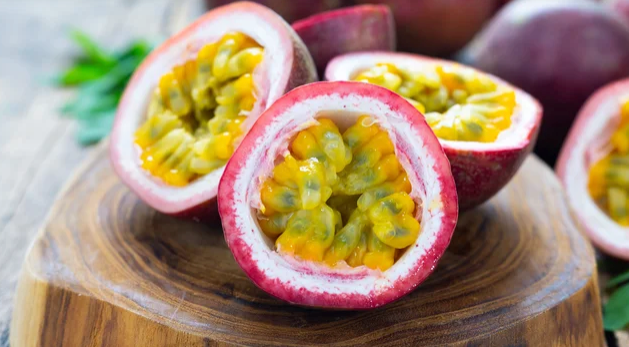By Ginger Cochran, MS RDN, CDCES, CEP-ACSM
Passion fruit is a superfruit with a fantastic taste and health benefits. You can find it in our Passionfruit Raspberry Protein Smoothie, bursting with protein, vitamins, minerals, antioxidants, and bioactive that help our bodies thrive. In this blog, we’re diving into the bioactive compounds and head-to-toe health benefits of this medicinal fruit, passionfruit.
-
Promotes Mental Health
Mental conditions such as depression and anxiety affect millions worldwide and are growing rapidly. Clinical trials have shown passion fruit may help promote relaxation and reduce symptoms of depression and anxiety.
Passionfruit is high in vitamin B6 (pyridoxine), vital for creating the neurotransmitter (chemical brain messenger) serotonin which helps balance and elevate a sense of happiness, potentially reducing feelings of anxiety and depression.
-
Reduces Arthritic Pain
Arthritis pain is associated with joint inflammation and can severely impact our quality of life and daily activities. Passion fruit is rich in anti-inflammatory and antioxidant properties, providing a natural remedy for arthritis by reducing inflammation and inflammatory markers. The antioxidants in passion fruit also protect the joints from oxidative stress, preventing further damage and enhancing joint function.
-
Promotes Quality Sleep
Quality sleep is essential for overall health and well-being. Passionfruit is rich in magnesium, a natural relaxant that helps calm the nervous system and promotes relaxation, promoting better sleep patterns and deeper sleep.
-
Superfruit Medicinal Flavonoids
-
Quercetin, Kaempferol, and Rutin
Passion fruit contains flavonoids called quercetin, kaempferol, and rutin. These passionfruit flavanols are antioxidants that neutralize free radicals in the body, protecting cells from oxidative stress and reducing the risk of chronic diseases like heart disease and certain cancers. Quercetin, in particular, has been studied for its anti-inflammatory effect by inhibiting the production of inflammatory molecules in the body, thus helping to alleviate symptoms related to arthritis and other inflammatory conditions.
-
Proanthocyanidins
Proanthocyanidins are the flavonoid responsible for its deep purple color. These purple compounds have a more potent antioxidant activity than vitamin C and vitamin E in some cases.
These antioxidants protect the skin from damage caused by ultraviolet rays and environmental pollution. Proanthocyanins also support cardiovascular health by enhancing blood vessel function, promoting healthy blood pressure levels, and reducing the risk of blood clot formation.
-
Harmals Alkaloids
Passion fruit contains harmala alkaloids, such as harmine and harmaline. These alkaloids have a potential sedative effect that may promote relaxation and sleep quality and reduce anxiety and stress.
-
Carotenoids
Carotenoids are responsible for the vibrant orange color in some passionfruit varieties. Beta-carotene, in particular, is a provitamin A carotenoid converted into essential vitamin A for the body. Getting enough vitamin A in the body is imperative for eye health.
-
Lycopene
Red and purple passionfruit contains lycopene. Lycopene is an incredible flavonoid known for disability to help prevent certain cancers, such as prostate cancer and reduce the risk of heart disease. Even though lycopene is a popular supplement, research shows it is most beneficial when consumed through food like passion fruit and Designer Wellness Passionfruit Raspberry Protein Smoothie.
Bottomline
To earn the title of “superfruit,” a fruit must contain an exceptionally high nutrient profile and a powerhouse of medical plant chemicals. Passion fruit ticks all the boxes on this, and that is why we included it in one of our Protein Smoothies. Try Passionfruit Raspberry and all our superfruit flavors here. Read more about what superfruits are in our blog, “What are Superfruits-and why you need them.”
Resources




